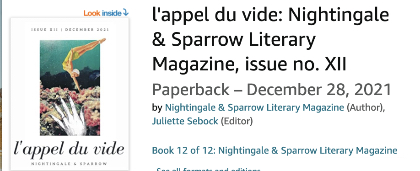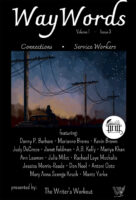I knew when I started writing Penances that it would be a hard sell: Suggesting that Saint Peter might create a role for a former  Mafia enforcer was impious if not sacrilegious. But the idea tickled my imagination; having tiptoed into irreverent territory, I decided to have fun embellishing my blasphemy.
Mafia enforcer was impious if not sacrilegious. But the idea tickled my imagination; having tiptoed into irreverent territory, I decided to have fun embellishing my blasphemy.
Zimbell House, which had published several of my stories, invited stories on a “debt collector” theme, but wanted 4,500-word pieces. When I told my story in half that, and didn’t see any point to padding it, Zimbell’s editors put my Penances on their maybe-yes list, but ultimately decided against it. A bunch of others turned it down; nobody said so, but I suspect they didn’t like mocking anyone’s faith.
Then Caustic Frolic, the literary journal of the NYU graduate school of arts and humanities, invited stories on the theme of “limbo.” They’d already published two other pieces of mine, and I was confident they’d take this. They did, and it’s out now: Read it ==>>here

 my fictive mind has been going back to remember – and imagine – what pregnant girls did when abortion was not only illegal but not available nearby, either. Was it a matter or shame or loss, or both? Was the secrecy of their decisions inviolable?
my fictive mind has been going back to remember – and imagine – what pregnant girls did when abortion was not only illegal but not available nearby, either. Was it a matter or shame or loss, or both? Was the secrecy of their decisions inviolable? in the late 1950s that was one of my favorites. When one of his stories popped into my head not long ago, it occurred to me that modern technology might allow elaborations Shep couldn’t have imagined.
in the late 1950s that was one of my favorites. When one of his stories popped into my head not long ago, it occurred to me that modern technology might allow elaborations Shep couldn’t have imagined.
 the year I was born. I set about to write the larger context of that summer’s trip: An early instance of the teen-age male urge to own a car.
the year I was born. I set about to write the larger context of that summer’s trip: An early instance of the teen-age male urge to own a car. like the one I’ve lived in now almost six years.
like the one I’ve lived in now almost six years. encounter a problem like my protagonist’s. Rather, because that I learned from her example that a math teacher can retire to occasional classroom tutoring . “Math Game” is out now in Panoply; read it
encounter a problem like my protagonist’s. Rather, because that I learned from her example that a math teacher can retire to occasional classroom tutoring . “Math Game” is out now in Panoply; read it  science fiction, supernatural, or weird stories.)
science fiction, supernatural, or weird stories.) housemates for two decades. Then the one who owns the house decides to re-marry; the other has to make new plans. I sent her to Montana, trolling.
housemates for two decades. Then the one who owns the house decides to re-marry; the other has to make new plans. I sent her to Montana, trolling. my Doctor’s Orders last September 17, and published it today, 10 1/2 months later! When they sent me a heads-up last week, I had to go back in my files to remember the story.
my Doctor’s Orders last September 17, and published it today, 10 1/2 months later! When they sent me a heads-up last week, I had to go back in my files to remember the story.